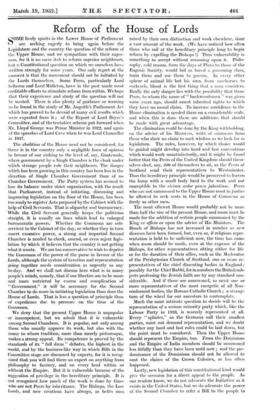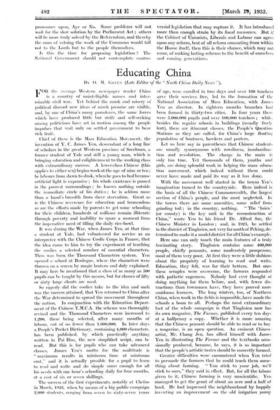Reform of the House of Lords
SOME lively spirits in the Lower House of Parliament arc seeking eagerly to bring again before the Legislature and the country the question of the reform of the Upper House, and we sympathize with their eager- ness, for it is no mere itch to reform superior neighbours, but a 'Constitutional question on which we ourselves have written strongly for some years. Our only regret at the moment is that the movement should not be initiated by the Lords themselves. Some Peers, particularly Lord Selborne and Lord Midleton, have in the past made most creditable efforts to stimulate reform from within. We hope that their experience and study of the question will not be wasted. There is also plenty of guidance or warning to be found in the study of Mr. Asquith's Parliament Act which has proved to be devoid of many evil results which were expected from it ; of the Report of Lord Bryce's Committee, and of the tentative scheme put forward when Mr. Lloyd George was Prime Minister in 1922, and again of the speeches of Lord Cave when he was Lord Chancellor in 1927.
The abolition of the House need not be considered, for there is in the country only a negligible force of opinion in favour of our sinking to the level of, say, Guatemala, where government by a Single Chamber is the cloak under which strange people rule their neighbours. The danger which has been growing in this country has been less in the direction of Single Chamber Government than of no Chamber Government. The Party system has seemed to Jose its balance under strict organization, with the result that Parliament, instead of initiating, discussing and improving legislation on the floor of the House, has been too ready to register Acts prepared by the Cabinet with the help of Civil Servants. That is oligarchy and bureaucracy. While the Civil Servant generally keeps the politician straight, it is usually on lines which lead to enlarged bureaucratic powers. Whether the Commons are sub- servient to the Cabinet of the day, or whether they in turn assert excessive power, a strong and impartial Second Chamber is needed to check, amend, or even reject legis- lation by which it believes that the country is not getting .what it wants. We are too conservative to wish to deprive the Commons of the power of the purse in favour of the .Lords, although the system of taxation and representation going together needs consideration as urgently as any to-day. And we shall not discuss here what is in many people's minds, namely, that if our liberties are to be more and more restricted by excess and complication of " Government," it will be necessary for the Second Chamber to do more in initiating legislation than does the House of Lords. That is less a question of principle than of expedience due to pressure . on the time of the Commons.
We deny that the present Upper House is unpopular_ or incompetent; but we admit that it is vulnerable among Second. Chambers. It is popular, not only among those who usually approve its work, but also with the many to whom tradition, more than merely picturesque, makes a strong appeal. Its competence is proved by the standards of its " full dress " debates, the highest in the . world, and by the business-like way in which Bills in the Committee stage are discussed by experts, for it is recog- nized that you will find there an expert on anything from philosophy to farriery, and on every land • within or ' without- the Empire. But it is vulnerable because of the suggestion of privilege in the hereditary principle. It is not recognized how much of the work is done by those Who-are not Peers by inheritance. The Bishops, the Law Lords, and new. creations have always, as- befits men
raised by their own distinction and work elsewhere, done a vast amount of the work. (We have noticed how often those who rail at the hereditary principle long to begin reform by expelling the Bishops !) Thus vulnerability is 'something to accept without reasoning upon it. Philo- sophy, cold reason, from the days of Plato to those of the Eugenic Society, would bid us breed a governing class, train them and use them to govern. In every other sphere of animal life but his own, frou racehorses to cockerels, blood is the first thing that a man considers. Really the only danger lies with the possibility that those Peers, to whom the name of " backwoodsmen " was given some years ago, should assert inherited rights to which they have no moral claim. To increase confidence in the House elimination is needed there on a considerable scale, and when this is done there are additions that should be made with great advantage.
The elimination could be done by the King withholding, on the advice of his Ministers, writs of summons from those who show no claim to such wisdom as we look for in legislators. The rules, however, by which choice would be guided might develop into hard and fast conventions which would work unsatisfactorily, and it might be found better that the Peers of the United Kingdom should them- selves elect, say, 200 of themselves to sit, as the Peers of Scotland send their representatives to Westminster. Thus the hereditary principle would be preserved to leaven the lump with a small body bred to the work and not susceptible to the civium ardor prava jubetaiwn. Peers who are not summoned to the Upper House must in justice be allowed to seek seats in the House of Commons as freely as other men.
The most efficient House would probably not be more than half the size of the present House, and room must be made for the addition of certain people summoned by the King ex officio or upon the advice of His Ministers. The Bench of Bishops has not increased in number as new dioceses have been formed, but, even so, if religious repre- sentation is held to be sufficient now, the time has come when room should be made, even at the expense of the Bishops, for other representatives sitting either for life or for. the duration of their office, such as the Moderator of the Presbyterian Church of Scotland, one or more re- presentatives of the chief dissenting bodies in England ; possibly for the Chief Rabbi, for in numbers the British sub- jects professing the Jewish faith are by any standard con- siderable. And if those are summoned, so must one or more representatives of the most energetic of all Non- conformist bodies, the Roman Catholic Church ; a strange turn of the wheel for our ancestors to contemplate.
Much the most intricate question to decide will be the representation of a serious minority party which, like the Labour Party in 1923, is scarcely represented at all. Every " splinter," -as the Germans call their smallest parties, must not demand representation, and we doubt whether any hard and fast rules could be laid down, but the point must be considered. Then the Upper House should represent the Empire, too. From the Dominions and the Empire of India members should be summoned less fitfully than they have been until now ; and the pre- dominance of the Dominions should not be allowed to oust the claims of the Crown Colonies, as has often happened.
Lastly, new legislation of this constitutional kind would give the occasion for a direct appeal to the people. As our readers know, we do not advocate the Initiative as it exists in the United States, but we do advocate the power ; of the Second Chamber to refer a Bill to the people to







































 Previous page
Previous page